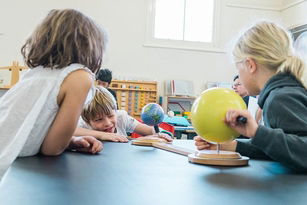Cosmic Education

Cosmic Education
How does one satisfy but not diminish the child’s mind?
How does one bring order to vast knowledge?
How does one capitalise on the child’s imaginative tendencies?
How does one facilitate moral enquiry?
To meet these fundamental needs of the primary child Maria Montessori developed the concept of "Cosmic Education".
"Since it has been ... necessary to give so much to the child, let us give him a vision of the whole universe. The universe is an imposing reality, and an answer to all questions.... All things are part of the universe, and are connected with each other to form one whole unity. The idea helps the mind of the child to become focused, to stop wandering in an aimless quest for knowledge. He is satisfied having found the universal centre of himself with all things."
(Maria Montessori, To Educate the Human Potential).
Cosmic education presents the universe as operating to a predetermined design in which all life, including humanity, has a part to play. Cosmic education allows children to develop a sense of awe and gratitude for the universe, their role in humanity and the work of people who came before them. Cosmic education begins with the story of the universe, through which the child sees the inter-relationship of all things. When the child is presented with the story of the universe, an overview, a set of first principles is established. This provides a context for the study of details. Studies are integrated and related to the whole. Different subjects are considered as interconnected, and are presented as such. For instance the history of Egypt is tied to the Nile, to geography, to art, to writing, to geometry - as in the 3-4-5 triangle used to survey following the floods - to flora and fauna and to papyrus, the writing paper used to record the history which was the point where we entered the chain.
Cosmic education provides a framework for all studies - subjects covered include mathematics, geometry, language, history, geography, biology, botany and science. Art, craft and music are also included in the program, and the child uses computers for research and presentation. Excursions which take the child out of his or her familiar environment into a variety of settings in the surrounding community are an essential means of learning for the child and are therefore an integral element in the program at this stage of development.
The Primary years are a great period of expansion, consolidation and intellectual growth. Having acquired a sound grasp of the basics in preschool, children are now ready and willing to acquire culture and to discover the world and their place in it. Their thirst for knowledge is such that by age 12 they will have been introduced to many of the areas of study usually reserved for the secondary years.